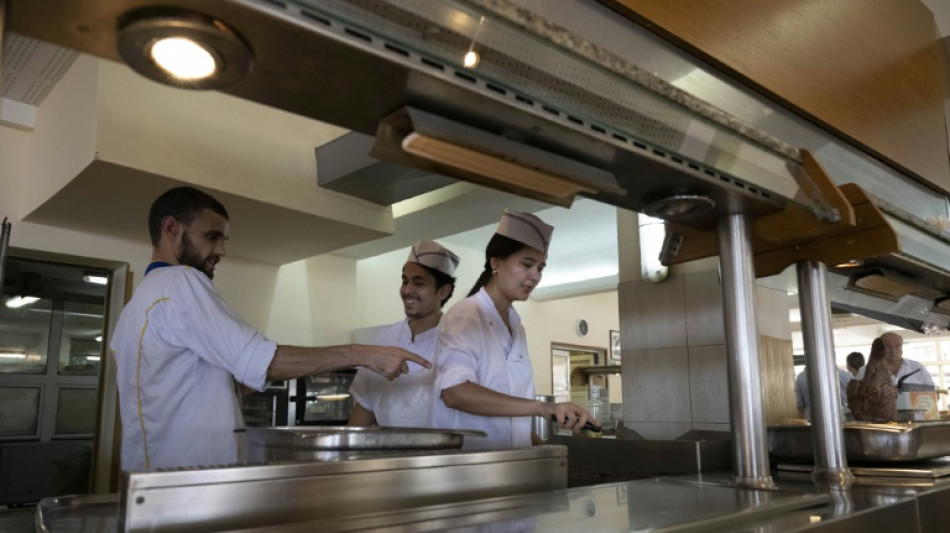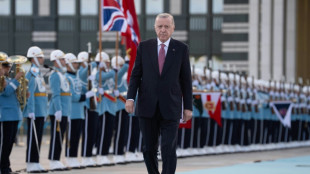
-
 Gauff-led holders USA to face Spain, Argentina at United Cup
Gauff-led holders USA to face Spain, Argentina at United Cup
-
Ecuador voters reject return of US military bases

-
 Bodyline and Bradman to Botham and Stokes: five great Ashes series
Bodyline and Bradman to Botham and Stokes: five great Ashes series
-
Iran girls kick down social barriers with karate

-
 Asian markets struggle as fears build over tech rally, US rates
Asian markets struggle as fears build over tech rally, US rates
-
Australia's 'Dad's Army' ready to show experience counts in Ashes

-
 UN Security Council set to vote on international force for Gaza
UN Security Council set to vote on international force for Gaza
-
Japan-China spat sinks tourism stocks

-
 Ecuador voters set to reject return of US military bases
Ecuador voters set to reject return of US military bases
-
Trump signals possible US talks with Venezuela's Maduro

-
 Australian Paralympics gold medallist Greco dies aged 28
Australian Paralympics gold medallist Greco dies aged 28
-
Leftist, far-right candidates go through to Chilean presidential run-off

-
 Zelensky in Paris to seek air defence help for Ukraine
Zelensky in Paris to seek air defence help for Ukraine
-
Bangladesh verdict due in ex-PM's crimes against humanity trial

-
 A pragmatic communist and a far-right leader: Chile's presidential finalists
A pragmatic communist and a far-right leader: Chile's presidential finalists
-
England ready for World Cup after perfect campaign

-
 Cervical cancer vaccine push has saved 1.4 million lives: Gavi
Cervical cancer vaccine push has saved 1.4 million lives: Gavi
-
World champion Liu wins Skate America women's crown

-
 Leftist leads Chile presidential poll, faces run-off against far right
Leftist leads Chile presidential poll, faces run-off against far right
-
Haaland's Norway thump sorry Italy to reach first World Cup since 1998

-
 Portugal, Norway book spots at 2026 World Cup
Portugal, Norway book spots at 2026 World Cup
-
Sinner hails 'amazing' ATP Finals triumph over Alcaraz

-
 UK govt defends plan to limit refugee status
UK govt defends plan to limit refugee status
-
Haaland's Norway thump Italy to qualify for first World Cup since 1998

-
 Sweden's Grant captures LPGA Annika title
Sweden's Grant captures LPGA Annika title
-
Tuchel lays down law to Bellingham after England star's frustration

-
 Sinner caps eventful year with ATP Finals triumph over great rival Alcaraz
Sinner caps eventful year with ATP Finals triumph over great rival Alcaraz
-
Portugal book spot at 2026 World Cup as England stay perfect

-
 Hakimi, Osimhen, Salah shortlisted for top African award
Hakimi, Osimhen, Salah shortlisted for top African award
-
Sinner beats great rival Alcaraz to retain ATP Finals title

-
 Schenk wins windy Bermuda Championship for first PGA title
Schenk wins windy Bermuda Championship for first PGA title
-
Crime, immigration dominate as Chile votes for president

-
 Kane double gives England record-setting finish on road to World Cup
Kane double gives England record-setting finish on road to World Cup
-
World champions South Africa add Mbonambi, Mchunu to squad

-
 Greenpeace says French uranium being sent to Russia
Greenpeace says French uranium being sent to Russia
-
'Now You See Me' sequel steals N. American box office win

-
 Argentina beat Scotland after frenzied fightback
Argentina beat Scotland after frenzied fightback
-
Argentina beat Scotland after stunning fightback

-
 Pope urges leaders not to leave poor behind
Pope urges leaders not to leave poor behind
-
Pressure will boost Germany in 'knockout' Slovakia clash, says Nagelsmann

-
 Ecuador votes on hosting foreign bases as Noboa eyes more powers
Ecuador votes on hosting foreign bases as Noboa eyes more powers
-
Portugal qualify for 2026 World Cup by thrashing Armenia

-
 Greece to supply winter gas to war battered Ukraine
Greece to supply winter gas to war battered Ukraine
-
India and Pakistan blind women show spirit of cricket with handshakes

-
 Ukraine signs deal with Greece for winter deliveries of US gas
Ukraine signs deal with Greece for winter deliveries of US gas
-
George glad England backed-up haka response with New Zealand win

-
 McIlroy loses playoff but clinches seventh Race to Dubai title
McIlroy loses playoff but clinches seventh Race to Dubai title
-
Ecuador votes on reforms as Noboa eyes anti-crime ramp-up

-
 Chileans vote in elections dominated by crime, immigration
Chileans vote in elections dominated by crime, immigration
-
Turkey seeks to host next COP as co-presidency plans falter


Uzbek workers fill gap as Bulgarian population shrinks
Nilfar Nazarova used to work as an accountant in her native Uzbekistan but for the past four summers she has been cleaning hotel rooms in the Bulgarian Black Sea resort of Albena.
"The first year, there were very few Uzbeks. Today, around 100 of us come every season, attracted by the stable and regular salaries," Nazarova, who is in her forties and from the city of Bukhara, told AFP.
"We feel welcomed like family."
While workers from Central Asia and further afield have been arriving for years in Central and Eastern Europe, many locals of working age have been seeking their fortunes elsewhere since the fall of Communism.
Bulgaria's population has shrunk by almost a third since 1990 and the country's tourism sector -- which accounts for almost seven percent of the economy -- now relies on foreign workers.
Tens of thousands of positions in the sector remained unfilled at the start of the season, the hotel owners association said.
And a recent survey of companies found that eight out of 10 employers were facing labour shortages, most saying they were willing to hire workers from countries outside the European Union.
- Demographic impact -
About 20,000 Uzbeks, including seasonal workers, ply their trade in the Balkan nation, according to former government official Philip Gounev.
"At this rate, they could become a significant minority within five or six years," said Gounev, a former deputy interior minister who now runs a migrant labour employment agency.
That would potentially change the demographic makeup of Bulgaria, the EU's poorest country, he said.
Demand had surged in recent years, he added.
In Albena, popular with visitors from across the continent, workers from Uzbekistan, Kyrgyzstan, Indonesia and other countries have taken up jobs in hotels, kitchens and bars.
The resort, which was once the pride of the Communist regime and hosted Cuba's Fidel Castro, has escaped the real estate frenzy that has transformed much of Bulgaria's Black Sea coastline.
"The work is hard but the people are kind," Uzbek student Gulraykhan Muxanbetovna said as she bustled around the crowded restaurant of a four-star hotel overlooking the Black Sea.
The 20-year-old's Instagram posts about her life in Albena have garnered her a loyal following of thousands on the social media platform.
"It's interesting for people in my country. They want to come too," she said.
- 'Matter of survival' -
Resort manager Krasimira Stoyanova said workers from abroad received food, accommodation and "a salary several times higher than what they would earn in Uzbekistan".
"That's what motivates them... There, they earn $100 to $150 a month. Here, salaries start at $600 and can reach $800 or more," she said.
Many Uzbeks also speak Russian, an advantage in Bulgaria, which has historically had close ties with Moscow.
The government recognises the importance of attracting migrant workers and has made it easier for them to get visas, Gounev said -- even if bureaucracy can still be "cumbersome" and corruption can put off some people.
"It's a matter of survival for Bulgarian businesses," he said.
And not only for businesses.
Bulgaria has one of the world's fastest shrinking populations.
Most Bulgarians who leave the country do not return and nearly a quarter of the population is now over 65 years old.
C.AbuSway--SF-PST



